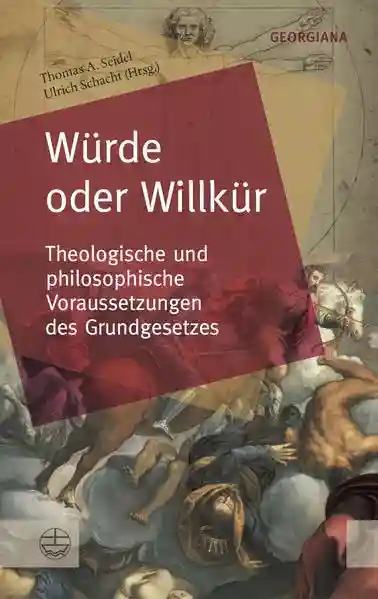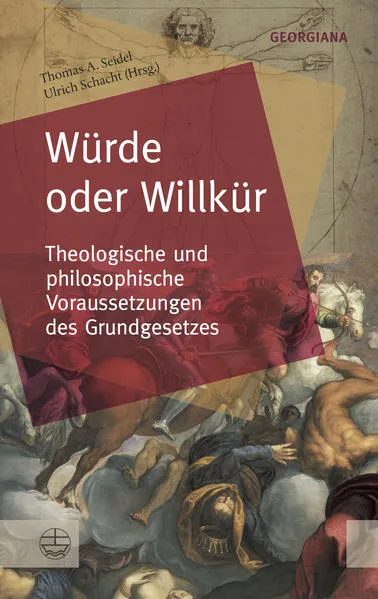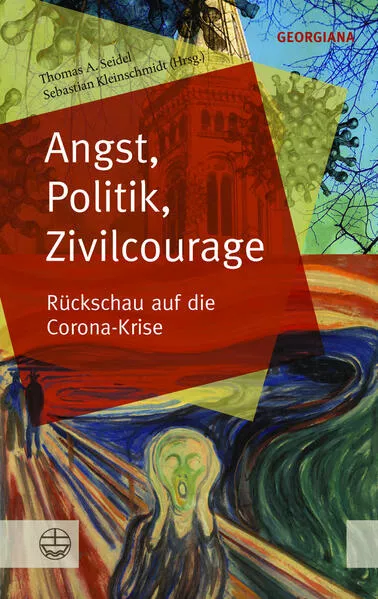Chronologie aller Bände (1 - 2)

Die Reihenfolge beginnt mit dem Buch "Würde oder Willkür". Wer alle Bücher der Reihe nach lesen möchte, sollte mit diesem Band von Thomas A. Seidel beginnen. Mit insgesamt 2 Bänden wurde die Reihe über einen Zeitraum von ungefähr 4 Jahren fortgesetzt. Der neueste Band trägt den Titel "Angst, Politik, Zivilcourage".
- Anzahl der Bewertungen für die gesamte Reihe: 11
- Ø Bewertung der Reihe: 5
- Start der Reihe: 01.10.2019
- Neueste Folge: 01.09.2023
- Band: 3
- Autor: Seidel, Thomas A.
- Anzahl Bewertungen: 1
- Ø Bewertung: 5.0
- Medium: Buch
- Veröffentlicht: 01.10.2019
- Genre: Sonstiges
Würde oder Willkür
Das Grundgesetz, die Verfassung des wiedervereinigten Deutschlands, wurzelt nicht in der Unbestimmtheit von Moderne und Säkularisierung. Es schöpft aus der entscheidenden Quelle des christlichen Abendlandes: dem biblisch bezeugten Gott und den sich daraus für die Gestaltung der zwischenmenschlichen Beziehungen in Staat und Gesellschaft ergebenden normativen Konsequenzen. Von daher ist es kein Zufall, dass der entscheidende sittlich-moralische Referenzpunkt am Beginn der Präambel nicht der Mensch ist, sondern Gott.
Dieser erste Satz variiert jenen Maßstab christlich grundierter Staatsformen und Gesellschaftsstrukturen, demzufolge der Mensch und Bürger sich im entscheidenden Moment, vor allem in Abwehr totalitärer Versuchungen, auf Gott und die fundamentale Weisheit der Bibel einlassen und verlassen kann. Im Zeitalter eines Säkularismus jedoch, der sich der totalen Dynamik von technischem Fortschritt und ökonomischer Globalisierung als Antriebsmittel und Endzeitperspektive gleichermaßen instrumentell bedient, ist der christliche Gottesbezug im Grundgesetz rechtsphilosophisch eine immer rabiater bestrittene, handlungspolitisch immer häufiger überlesene und multikulturell immer radikaler infrage gestellte Prämisse. Dem soll und muss widersprochen werden.
Mit Beiträgen von Udo Di Fabio, Thibaut de Champris, Wilfried Härle, Benjamin Hasselhorn, Heinrich Oberreuter, Friedemann Richert, Thomas A. Seidel, Ulrich Schacht +, Barbara Wenz sowie einem Grußwort von Hildigund Neubert und einem Nachruf auf Ulrich Schacht von Sebastian Kleinschmidt.
[Dignity and Arbitrariness. Theological and Philosophical Premises of the Basic Law]
The Basic Law, the constitution of reunited Germany, has its roots not in the indeterminacy of modernity and secularization. Instead, it draws from the decisive source of the Christian West: God as testified in the scriptures and the resulting normative framework for the design of interpersonal relationships in society and state. Therefore, it is no coincidence that at the beginning of the preamble the decisive ethical reference point is not mankind but God. This initial sentence refers to the criterion of any form of government or social structure that is basing itself on Christianity according to which human beings and citizens can rely in critical moments on God and the fundamental wisdom of the Bible. But in the age of secularism the Christian reference to God in the Basic Law has been increasingly challenged by philosophy of law, is often ignored by politics, and has become a multiculturally questioned premise. This has to be refuted.
Mit Beiträgen von Udo Di Fabio, Thibaut de Champris, Wilfried Härle, Benjamin Hasselhorn, Heinrich Oberreuter, Friedemann Richert, Thomas A. Seidel, Ulrich Schacht +, Barbara Wenz sowie einem Grußwort von Hildigund Neubert und einem Nachruf auf Ulrich Schacht von Sebastian Kleinschmidt.
[Dignity and Arbitrariness. Theological and Philosophical Premises of the Basic Law]
The Basic Law, the constitution of reunited Germany, has its roots not in the indeterminacy of modernity and secularization. Instead, it draws from the decisive source of the Christian West: God as testified in the scriptures and the resulting normative framework for the design of interpersonal relationships in society and state. Therefore, it is no coincidence that at the beginning of the preamble the decisive ethical reference point is not mankind but God. This initial sentence refers to the criterion of any form of government or social structure that is basing itself on Christianity according to which human beings and citizens can rely in critical moments on God and the fundamental wisdom of the Bible. But in the age of secularism the Christian reference to God in the Basic Law has been increasingly challenged by philosophy of law, is often ignored by politics, and has become a multiculturally questioned premise. This has to be refuted.
- Band: 9
- Autor: Seidel, Thomas A.
- Anzahl Bewertungen: 10
- Ø Bewertung: 5.0
- Medium: Buch
- Veröffentlicht: 01.09.2023
- Genre: Politik
Angst, Politik, Zivilcourage
Wo Gefahr droht, ist Angst eine natürliche Reaktion. Sie kann lebensrettend sein. Gute Politik ist daran zu erkennen, ob es ihr gelingt, Gefahren zu identifizieren, sachgerecht zu analysieren und angemessene Gegenmaßnahmen zu ergreifen, die allgemeinverständlich kommuniziert und fortlaufend geprüft werden.Doch was passiert, wenn die Analyse fehlerhaft ist? Wenn Gegenmaßnahmen überzogen oder gefährlich sind? Wenn mediale Kommunikation die Angst noch befeuert? Wenn die notwendige Evaluation mangelhaft ist und folgenlos bleibt?Der Blick auf die zurückliegenden Krisen-Jahre zeigt die Brisanz folgender Fragen: Wer sind die Profiteure der Angst? Was bedeutet und bewirkt die christliche Botschaft der Furchtlosigkeit? Wie kann kraftvolle Zivilcourage einer Staatskunst auf die Beine helfen, die »der Stadt Bestes sucht«?
Mit Beiträgen von Staffan Carlsson, Christian Dietrich, Erich Freisleben, Sebastian Kleinschmidt, Uwe Kolbe, André Kruschke, Vera Lengsfeld, Rochus Leonhardt, Wolfgang Sander, Kathrin Schmidt, Heimo Schwilk, Hellmut Seemann, Thomas A. Seidel, Harald Seubert, Markus Spieker und Ulrich Teusch.
[“Do not fear”Fear, Politics, Civil Courage]Where there is danger, fear is a natural reaction. It can save lives. Good policy can always be recognized by whether it succeeds in identifying real dangers, analyzing them properly and taking appropriate countermeasures that are continually reviewed and communicated in a way that is generally understandable. But what happens if the analysis is flawed? When countermeasures are exaggerated or even dangerous? When the media fuels fear to increase returns or power? When scientific and political evaluation is flawed and without consequences?A look at the past years of crises – one may mention keywords such as migration, climate, Corona, Ukraine war – shows the explosive force of the following questions: Who profits from fear? What does the Christian message of fearlessness mean and achieve? How can a powerful civil courage serve peace and help a politics on its feet to “seek the peace of the city”?
Mit Beiträgen von Staffan Carlsson, Christian Dietrich, Erich Freisleben, Sebastian Kleinschmidt, Uwe Kolbe, André Kruschke, Vera Lengsfeld, Rochus Leonhardt, Wolfgang Sander, Kathrin Schmidt, Heimo Schwilk, Hellmut Seemann, Thomas A. Seidel, Harald Seubert, Markus Spieker und Ulrich Teusch.
[“Do not fear”Fear, Politics, Civil Courage]Where there is danger, fear is a natural reaction. It can save lives. Good policy can always be recognized by whether it succeeds in identifying real dangers, analyzing them properly and taking appropriate countermeasures that are continually reviewed and communicated in a way that is generally understandable. But what happens if the analysis is flawed? When countermeasures are exaggerated or even dangerous? When the media fuels fear to increase returns or power? When scientific and political evaluation is flawed and without consequences?A look at the past years of crises – one may mention keywords such as migration, climate, Corona, Ukraine war – shows the explosive force of the following questions: Who profits from fear? What does the Christian message of fearlessness mean and achieve? How can a powerful civil courage serve peace and help a politics on its feet to “seek the peace of the city”?

